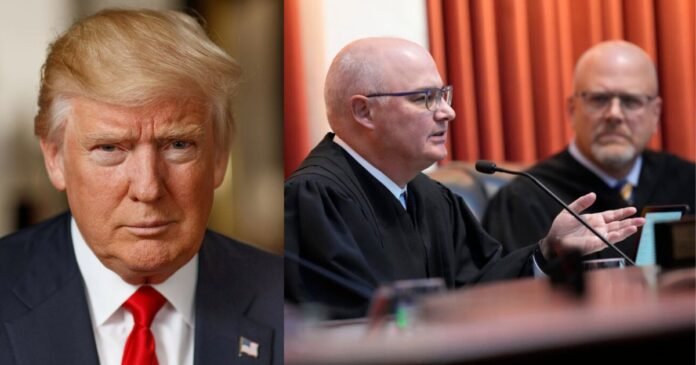The Colorado Supreme Court ruling has declared that Donald Trump cannot participate in the Colorado presidential race due to his actions preceding the January 6 riot. This verdict raises questions about his eligibility for the broader 2024 election. The decision, citing the US Constitution’s insurrection clause, challenges Trump’s candidacy in the state’s Republican primary. Trump vows to contest this in the US Supreme Court, signaling a potential legal showdown that may impact the upcoming presidential contest, where he is anticipated to be a key Republican candidate against Democratic President Joe Biden.
The Colorado Supreme Court rendered its historic ruling based on the premise of “clear and convincing evidence that President Trump engaged in insurrection.” The majority opinion, supported by a 4-3 vote, found Trump disqualified under Section 3 of the 14th Amendment to the US Constitution. This section specifically disqualifies individuals involved in “insurrection or rebellion” against the Constitution from holding federal office. Originating from the post-Civil War era, Section 3 aimed to prevent those who supported the secession of southern states from returning to government positions.
Reasons Behind the Colorado Supreme Court’s Ruling Against Donald Trump
This marks the first instance of Section 3 being employed to disqualify a presidential candidate, making it a landmark decision. The split ruling signifies that three judges on the court dissented, asserting there is no legal basis for excluding Mr. Trump from the ballot. The comprehensive 213-page ruling meticulously detailed that Trump’s actions leading up to January 6 indeed met the threshold of insurrection. Despite arguments from Trump’s legal team in Colorado contending that he shouldn’t be disqualified for lack of responsibility for the riot, the court reached a different conclusion.
Is Donald Trump Eligible for the 2024 Election Amidst Colorado Supreme Court’s Decision?
This decision solely impacts Colorado, allowing Mr. Trump to participate in other Republican primaries across states, maintaining his significant lead over rivals in the quest for the party’s nomination. Given his substantial support, winning in Colorado may not be pivotal for his overall candidacy. However, the broader significance lies in the potential influence on similar cases in other states. With numerous lawsuits attempting to block Trump’s candidacy, the Colorado ruling sets a precedent that could embolden similar efforts elsewhere, potentially impacting the outcome in closely contested states during the general election.
Trump’s Appeal to the US Supreme Court
The Trump campaign has promptly announced its intention to appeal this decision to the US Supreme Court, the nation’s highest judicial authority. The timeline for the Supreme Court’s decision remains uncertain, as it will be determined in the upcoming year. Mr. Trump’s name will persist on the Colorado ballot as long as the appeal is submitted by January 4, awaiting the Supreme Court’s ruling. The legal deliberations by the justices, a process that requires time, will be closely watched, especially with the primary scheduled for March 5. A national implication is conceivable, depending on the Supreme Court’s decision, potentially influencing similar lawsuits in other states. The current conservative majority on the Supreme Court, shaped in part by Trump-appointed justices, adds another layer of significance to this legal battle.
Legal Perspectives and the Scope of Section3
In the aftermath of the Colorado Supreme Court’s decision, legal experts find themselves at the crossroads of two pivotal questions, debating the nature of Trump’s actions and the applicability of Section 3 to the presidency. The lower court’s interpretation clashes with the recent ruling, setting the stage for a nuanced legal discussion.
Political Ramifications: A Controversial Verdict Amidst Election Dynamics
The Colorado Supreme Court’s decision has ignited a fierce political debate, with the Trump campaign vehemently denouncing it as a tool of persecution. Steven Cheung, the campaign’s spokesman, framed the ruling as an infringement on voters’ rights, arguing that the electorate in Colorado is being denied the opportunity to choose their preferred candidate. This sentiment is echoed even by some of Trump’s political adversaries, such as Chris Christie, who, despite being critical of Trump, expressed concerns over the perceived undemocratic nature of the ruling. As legal challenges mount against Trump, the impact on his political standing remains a complex and polarizing facet of the ongoing election landscape.
